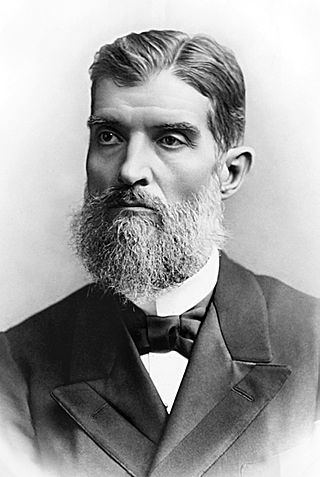
The Senate is the upper house of the Cortes Generales, which along with the Congress of Deputies – the lower chamber – comprises the Parliament of the Kingdom of Spain. The Senate meets in the Palace of the Senate in Madrid. The presiding officer of the Senate is the president of the Senate, who is elected by the members at the first sitting after each national election.

The Congress of the Union, formally known as the General Congress of the United Mexican States, is the legislature of the federal government of Mexico. It consists of two chambers: the Senate of the Republic and the Chamber of Deputies. Its 628 members meet in Mexico City.

The Michigan Legislature is the legislature of the U.S. state of Michigan. It is organized as a bicameral body composed of an upper chamber, the Senate, and a lower chamber, the House of Representatives. Article IV of the Michigan Constitution, adopted in 1963, defines the role of the Legislature and how it is to be constituted. The chief purposes of the Legislature are to enact new laws and amend or repeal existing laws. The Legislature meets in the Capitol building in Lansing.

The Senate of the Republic, constitutionally Chamber of Senators of the Honorable Congress of the Union, is the upper house of Mexico's bicameral Congress. It currently consists of 128 members, who serve six-year terms.

Prudente José de Morais Barros, often referred to as Prudente de Morais, was a Brazilian lawyer and politician who served as the third president of Brazil from 1894 to 1898. Morais was elected in 1894, being the first civilian president of the country, the first to be elected by direct popular ballot under the permanent provisions of Brazil's 1891 Constitution, and the first to serve his term in its entirety. Before his presidency he served as president (governor) of the state of São Paulo and president of the Senate from 1891 to 1894. He was also president of the Constituent Congress that drafted and enacted Brazil's 1891 Constitution.

Brazil elects on the national level a head of state — the president — and a legislature. The president is elected to a four-year term by absolute majority vote through a two-round system. The National Congress has two chambers. The Chamber of Deputies has 513 members, elected to a four-year term by proportional representation. The Federal Senate has 81 members, elected to an eight-year term, with elections every four years for alternatively one-third and two-thirds of the seats. Brazil has a multi-party system, with such numerous parties that often no one party has a chance of gaining power alone, and so they must work with each other to form coalition governments.

The Connecticut State Senate is the upper house of the Connecticut General Assembly, the state legislature of the U.S. state of Connecticut. The state senate comprises 36 members, each representing a district with around 99,280 inhabitants. Senators are elected to two-year terms without term limits. The Connecticut State Senate is one of 14 state legislative upper houses whose members serve two-year terms; four-year terms are more common.
Cidadania is a Brazilian political party. It was originally founded as the Popular Socialist Party by members of the former Brazilian Communist Party (PCB), as a centre-left social democratic and democratic socialist party. Despite its left-wing alignment, PPS moved to be opposition against the Workers' Party since 2004, forming alliances with centre-right parties, in particular the Brazilian Social Democracy Party (PSDB), and supporting the Impeachment of Dilma Rousseff. Later the party's National Convention adopted the new naming in March 2019, and it was later approved by the Superior Electoral Court that September. The party then began moving towards a more social liberal position akin to the third way.

The Chamber of Deputies is a federal legislative body and the lower house of the National Congress of Brazil. The chamber comprises 513 deputies, who are elected by proportional representation to serve four-year terms. The current president of the chamber is the Deputy Arthur Lira (PP-AL), who was elected on 1 February 2021.

The National Congress of Argentina is the legislative branch of the government of Argentina. Its composition is bicameral, constituted by a 72-seat Senate and a 257-seat Chamber of Deputies. The Senate, a third of whose members are elected to six-year renewable terms every two years, consists of three representatives from each province and the federal capital. The Chamber of Deputies, whose members are elected to four-year terms, is apportioned according to population, and renews their members by a half each two years.

The Federal Senate is the upper house of the National Congress of Brazil. When created under the Imperial Constitution in 1824, it was based on the House of Lords of the British Parliament, but since the Proclamation of the Republic in 1889 and under the first republican Constitution the Federal Senate has resembled the United States Senate.
The Democrats was a centre-right political party in Brazil that merged with the Social Liberal Party to found the Brazil Union in 2021. It was founded in 1985 under the name of Liberal Front Party from a dissidence of the defunct Democratic Social Party (PDS), successor to the National Renewal Alliance (ARENA), the official party during the military dictatorship of 1964–1985. It changed to its current name in 2007. The original name reflected the party's support of free market policies, rather than the identification with international liberal parties. Instead, the party affiliated itself to the international federations of Christian-democratic (CDI) and conservative parties (IDU). The Democrats' identification number is 25 and its colors are green, blue, and white.

The inauguration of the president of Brazil is composed of several ceremonies that happen in the same day. Through democratic elections or coups, resignations and deaths, presidential inaugurations have been important events in Brazilian history.
The Federal Government of Brazil is the national government of the Federative Republic of Brazil, a republic in South America divided into 26 states and a federal district. The Brazilian federal government is divided into three branches: the executive, which is headed by the President and the cabinet; the legislative, whose powers are vested by the Constitution in the National Congress; and the judiciary, whose powers are vested in nine organs, including the Supreme Federal Court and lower federal courts. The seat of the federal government is located in Brasília.

Auro Soares de Moura Andrade, commonly known as Auro de Moura Andrade or Moura Andrade, was a Brazilian lawyer and politician. He was born into a wealthy family of farmers from the countryside, son of the cattle rancher Antônio Joaquim de Moura Andrade, known as "The King of the Cattle".

The 56th Legislature of National Congress was a meeting of the legislative branch of the Federal Government of Brazil, composed by the Federal Senate and the Chamber of Deputies. It convened in Brasília on 1 February 2019, a month after the beginning of Jair Bolsonaro's only term as president, and ended on 31 January 2023.
The National Brazilian Congress has a bicameral system, with the Chamber of Deputies and the Federal Senate. Women are extremely underrepresented in both parts of the Congress. Between 1983 and 2015 women only made up on average 7.2% of seats in the Senate, and 6.2% of seats in the Chamber of Deputies. While the majority of seats on both the Senate and the Chamber of Deputies were held by male politicians.

The 57th Legislature of National Congress is the current meeting of the legislative branch of the Federal Government of Brazil, composed by the Federal Senate and the Chamber of Deputies. It convened in Brasília on 1 February 2023, a month after the inauguration of the winner of the 2022 presidential election.

The National Congress Palace is a building in Brasilia, Brazil that serves as the meeting place of the Brazilian national legislature, the National Congress of Brazil. It was built in 1960.

The General Assembly was the bicameral parliament of the Empire of Brazil. Article 14 of the Imperial Constitution established the General Assembly, which consisted of the Chamber of Deputies and the Senate.



































